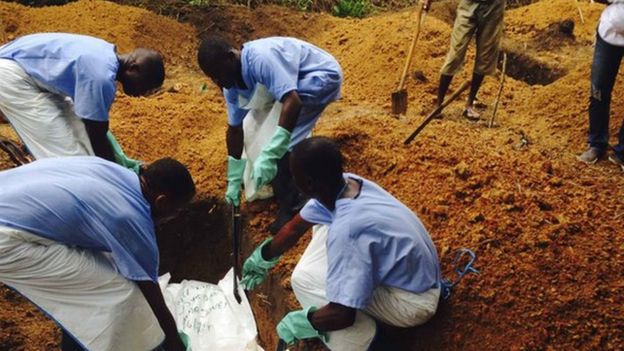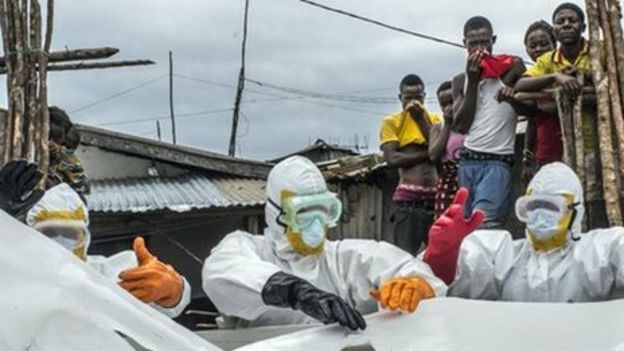|
|
TODAY.AZ / World news
Ebola global response was 'too slow', say health experts
24 November 2015 [15:38] - TODAY.AZ

A slow international response and a failure of leadership were to blame for the "needless suffering and death" caused by the recent Ebola epidemic, an independent panel of global health experts has concluded.
The panel's report, published in The Lancet, said major reforms were needed to prevent future disasters.
More than 11,000 people died in the outbreak, which began in 2013.
The World Health Organization has set out plans for reform.
Ebola cases
Guinea, Liberia and Sierra Leone were the countries most badly affected by Ebola.
The independent group of experts, convened by The Harvard Global Health Institute and the London School of Hygiene & Tropical Medicine, said these countries were unable to detect, report and respond rapidly to outbreaks - something which allowed Ebola to develop into "a worldwide crisis".
But the report reserved most criticism for the World Health Organization, saying it was too slow to declare Ebola an international public health emergency - five months after Guinea and Liberia had notified it of outbreaks.
It said the WHO had also failed to meet its responsibilities for responding to the outbreak because of a lack of leadership and accountability.
WHO's director-general Margaret Chan has already said publicly that, with the benefit of hindsight, WHO could have mounted a more robust response. And she has promised some fundamental changes to the Organization, such as creating a single new programme for health emergencies.
 Reuters
ReutersWhen a global response did eventually materialise, towards the end of 2014, it was deemed to be slow, inflexible to conditions on the ground, inadequately informed and poorly co-ordinated.
"The reputation and credibility of the WHO has suffered a particularly fierce blow," the report said.
The panel also criticised some political leaders for playing down the outbreak and not calling for international help.
Deadliest outbreak
 Getty Images
Getty Images- Over 11,000 people have died from Ebola since the epidemic erupted in 2014 - a six-fold increase of victims since its discovery in 1976.
- Some scientists say there's a risk the virus may become an ever-present disease in West African society.
Timeline: How we lost control of the Ebola virus

Early reporting
The report makes 10 recommendations for improving systems to cope with future outbreaks.
These include calls for a global strategy to help poorer countries monitor and respond to infectious diseases.
Those countries that delay reporting outbreaks and sharing information should be named and shamed, it says.
The report also recommends creating a dedicated centre for outbreak response at the WHO, which has a protected budget.
And a global fund should be set up to finance research and development of drugs and vaccines to treat infectious diseases.
The panel, made up of 20 experts in global health from around the world, was chaired by Prof Peter Piot, director of the London School of Hygiene and Tropical Medicine and co-discoverer of the Ebola virus.
 Science Photo Library
Science Photo LibraryHe said: "Major reform of national and global systems to respond to epidemics are not only feasible, but also essential so that we do not witness such depths of suffering, death and social and economic havoc in future epidemics."
'Game changer'
Prof Piot added: "The AIDS pandemic put global health on the world's agenda. The Ebola crisis in West Africa should now be an equal game- changer for how the world prevents and responds to epidemics."
Ashish K Jha, director of the Harvard Global Health Institute and a professor of medicine, said: "People at WHO were aware that there was an Ebola outbreak that was getting out of control by spring… and yet it took until August to declare a public health emergency. The cost of the delay was enormous."
Dr Jeremy Farrar, director of the Wellcome Trust, said the report offered "some sobering lessons".
"Particularly welcome are the calls for greater investment from governments to build a core capacity to detect, report and respond rapidly to outbreaks, as is the idea of creating a dedicated centre for outbreak response within the WHO," he said.
"It's vital that the lessons learned are translated into concrete action if we are to avert another crisis on the scale of Ebola."
A WHO spokeswoman said: "WHO welcomes the report.
"A number of its recommendations cover work that is already being done."
URL: http://www.today.az/news/regions/145424.html
 Print version
Print version
Connect with us. Get latest news and updates.
See Also
- 10 November 2025 [23:09]
Washington eases Syria sanctions as President Sharaa visits White House - 10 November 2025 [22:43]
Senegal vows domestic recovery funding amid deepening economic crisis - 10 November 2025 [22:12]
UK deploys personnel and equipment to assist Belgium against mysterious drones - 10 November 2025 [21:37]
Historic White House visit for Syria’s Sharaa as US pushes for Abraham Accords participation - 10 November 2025 [21:15]
Deadly car blast at Delhi’s Red Fort claims 8 lives, injures 15 - 10 November 2025 [21:10]
Typhoon Kalmaegi death toll in Philippines rises to 224 - 10 November 2025 [20:22]
Sisi and Shoigu deepen Egypt–Russia strategic partnership in Cairo talks - 10 November 2025 [19:18]
Extreme weather driving refugees to the brink, UN warns - 10 November 2025 [17:41]
Sarkozy released from La Santé prison amid ongoing legal battle - 10 November 2025 [09:00]
S. Korean companies sign US$11 mln worth of export deals, MOUs at K-brand expo in New Jersey
Most Popular
 Global media highlights Azerbaijan’s grand military parade on fifth anniversary of victory
Global media highlights Azerbaijan’s grand military parade on fifth anniversary of victory
 Historic White House visit for Syria’s Sharaa as US pushes for Abraham Accords participation
Historic White House visit for Syria’s Sharaa as US pushes for Abraham Accords participation
 Baku emerges as key pivot in Trump’s vision for new Eurasian economic map
Baku emerges as key pivot in Trump’s vision for new Eurasian economic map
 Azerbaijani Embassy in Slovakia marks Victory Day with commemorative event in Bratislava
Azerbaijani Embassy in Slovakia marks Victory Day with commemorative event in Bratislava
 Türkiye conducts normalization process with Armenia in coordination with Azerbaijan
Türkiye conducts normalization process with Armenia in coordination with Azerbaijan
 UK deploys personnel and equipment to assist Belgium against mysterious drones
UK deploys personnel and equipment to assist Belgium against mysterious drones
 Ferry from Trabzon denied entry to Sochi port
Ferry from Trabzon denied entry to Sochi port
